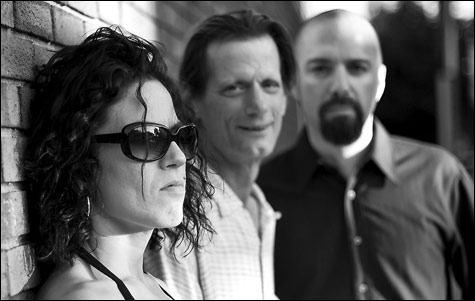
THREE FOR ALL: “We like things that sound low and deep and simple and groovy.” |
The sound on A.K.A.C.O.D.’s new Happiness CD — baritone sax, drums, slippery fretless bass and two-string slide bass combined with sultry bottom-register vocals — is going to make many Boston listeners think one word: Morphine. The comparisons are something that A.K.A.C.O.D. (also known as Colley/Ortiz/Dersch), who play Church December 6, are accustomed to. Saxophonist Dana Colley was one-third of the beloved Boston “low-rock” trio created by singer/bassist/songwriter Mark Sandman. Drummer Larry Dersch, a long-time utility player on the Boston scene (Binary System, with Roger Miller, and the Concussion Ensemble), did some recording with Morphine. And for singer-songwriter Monique Ortiz, who’s best known for her performances and CDs under the band name Bourbon Princess, Morphine has been a constant. It was Sandman, after all, who encouraged her to move here from Lancaster, Pennsylvania, when she and a friend saw Morphine in Philadelphia and were knocked out by the sound. After the show, they found themselves complaining to Sandman about the lack of a local scene. His reply, after a very pregnant, Sandman-esque pause: “I think you need to relocate.”
“I was already exploring some of those elements,” Ortiz says of Morphine’s sound when I get together with the band over beers at the Abbey Lounge. “I’d hear something in my head and nobody else was doing it — so how do I make this? I was taking my basses apart and playing a lot of fretless bass and doing a lot of drony things, and I couldn’t find anyone to play with who understood what I was trying to do.”
When she heard Morphine, she says, “I was excited and a little pissed off, because ‘these guys are doing it! There’s somebody out there doing it!’ ”
She moved to Boston, played in various bands, and formed Bourbon Princess. When Sandman died on stage in Palestrina, Italy, during a Morphine performance in July 1999, she recalls, “I wasn’t just sad that he was gone, I was sad that there were certain sounds I wanted to keep hearing. I knew the only way I was going to hear them, or hear new things done with them, was if I did it myself.”
Colley had his own issues with the Morphine sound. When Bourbon Princess recorded at Morphine’s Hi-N-Dry studio and he was brought in as an engineer, he at first resisted getting further involved in Ortiz’s music. But then he recorded with Bourbon Princess on 2003’s Black Feather Wings (Accurate). “I don’t know why it is that I had such a problem with it to begin with, because it’s where we come from, it’s what we created, and to delve into that and to borrow or be influenced from our own past shouldn’t be a problem. I faced my reservations and realized they were of my own making, because the music itself was its own thing.” As for his musical relationship with Ortiz: “We’re both coming from the same æsthetic — we like things that sound low and deep and simple and groovy. It’s a coincidence, maybe, but it’s also where we’re both moved to make music.”